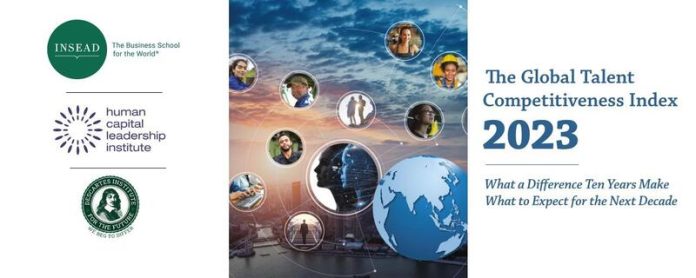Switzerland, Singapore and the United States firmly retain their leading positions as the world’s most talent-competitive countries, according to the Global Talent Competitiveness Index (GTCI) 2023.
This year, Denmark, the Netherlands, Finland, Norway, Australia, Sweden and the United Kingdom make up the rest of the Top 10.
European countries continue to dominate the Top 25, with 17 of them ranked. Beyond Europe – Australia, Canada, New Zealand, the United Arab Emirates, South Korea, and Israel join the top 25. UAE has moved up from 25th to 22nd while Japan dropped out, replaced by South Korea (24th).
Looking back at the past decade, one significant highlight is that the top ten countries have largely remained the same. Remarkably, eight of the top ten countries this year were also in the inaugural top ten in 2013.
Several of the largest emerging economies are among the best improvers over the past decade: Notable examples include: China has moved from being a talent mover to a talent champion; Indonesia is one of the countries with the greatest strides in talent competitiveness over the past decade; Mexico has moved from being a talent laggard to a talent mover; and Brazil has progressed may well soon categorise as a talent mover.
Titled “What a difference ten years make – and what to expect for the next decade”, the GTCI 2023 is published by INSEAD, in collaboration with Descartes Institute for the Future, and the Human Capital Leadership Institute.
The 10th edition of the report covers 134 countries around the world across all income groups.
Positioned as the leading comprehensive annual benchmarking report, the GTCI measures how countries and cities grow, attract and retain talent.
It provides a unique resource for decision makers to understand the global talent competitiveness picture and develop strategies to boost their economies.
What will talent competitiveness look like in the next 10 years?
The 10th year edition of this report boldly offers a ‘time capsule’ of six key messages, to be confronted with the talent reality of 2033.
Talent competitiveness will gain even more importance as a critical element of competitiveness, innovation and geo-political soft power for nations, cities and organisations.
The talent competition will grow fiercer. As uncertainties and international tensions will continue to accumulate (in trade, investment, politics and diplomacy), there will be growing talent wars.
The world of work will further transform, driven by evolving expectations from younger generations, new economic models and emerging technologies like AI.
Cities and regions will pioneer new talent strategies and innovation. Quality of life and sustainability will be a critical asset for those aiming at becoming talent hubs.
Global talent-focused policies will be crucial to prevent tensions and harness human and technological potential for a better, more sustainable and equal world.
Skills and education will remain vital tools to empower workers to make meaningful contributions to their economies and societies.
Drawing the lessons from ten years of GTCI
In its 10th edition, the GTCI 2023 celebrates the remarkable milestone of a decade of pioneering talent insights. Over that period, six major trends have emerged :
- Talent inequalities remain high among countries: One of the most recurrent themes has been that the global talent competitiveness landscape is fraught with inequalities.
- Poorer economies do not perform as well on the talent scene as richer economies have. Despite significant progress made by some of the largest emerging economies such as India and China, the wealth/talent correlation remains strong.
- Talent inequalities also die hard within societies: Despite progress in reducing gender gaps, women continue to face unequal pay and limited career growth. While Covid-19 thwarted the process, pushing some to irreversible levels, the post-COVID recovery may deepen them further. AI and new work practices are changing the job landscape, affecting both unskilled and highly skilled workers.
- COVID has deeply altered the global talent landscape: During the COVID years, national and organisational talent strategies have been challenged to adapt to a dramatically changed environment for education, work, and activity.
- The new practices adopted will contribute to a new normal and a new world of work is emerging and evolving. For talent, ‘quality of life’ is increasingly important, and this trend might possibly accelerate in subsequent years.
- Cities and regions play increasingly important roles in talent: Global City Talent Competitiveness Index (GCTCI) repeatedly emphasised how cities had been able to deploy original and effective talent strategies, and how ‘second-tier’ cities were increasingly successful at deploying talent policies.
- Growing uncertainties hamper brain circulation: The recent period (as well as the one that is lying ahead) has not offered fertile ground for one of the most positive trends identified by GTCI before COVID, namely ‘brain circulation’.
- Although international travel has resumed, persistent uncertainties and geopolitical tensions continue to hinder direct (face-to-face) cooperation and limit talent cross-fertilisation.
New generations are reshaping the world of work: An increasing proportion of new generations, especially the higher educated, didn’t necessarily prioritise high-demand skills.
Many look for meaningful jobs where they can contribute to society or desire a healthier work-life balance. Gigs and short-term contracts have also become the new norm for a growing number of workers.






















